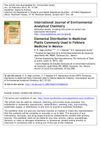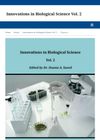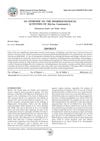 108 citations,
November 2006 in “The Milbank Quarterly”
108 citations,
November 2006 in “The Milbank Quarterly” Drug advertising has greatly increased, changing consumer behavior and raising concerns about its influence on healthcare and patient protection.
 8 citations,
February 1997 in “International journal of environmental analytical chemistry”
8 citations,
February 1997 in “International journal of environmental analytical chemistry” Most medicinal plants in Mexican folklore have safe element levels, but arsenic exceeds safe limits in almost all.
 2 citations,
October 2022 in “International journal of Ayurvedic medicine”
2 citations,
October 2022 in “International journal of Ayurvedic medicine” Licorice has many traditional health benefits, but more research is needed to fully support these claims.
 57 citations,
February 2018 in “Journal of the American Academy of Dermatology”
57 citations,
February 2018 in “Journal of the American Academy of Dermatology” Biotin supplements are not proven to improve hair or nails and may interfere with medical tests.
 1 citations,
January 2019 in “International Journal of ChemTech Research”
1 citations,
January 2019 in “International Journal of ChemTech Research” Eclipta prostrata has many medicinal benefits, but more research is needed to understand how it works.
 4 citations,
January 2022 in “Life”
4 citations,
January 2022 in “Life” Tissue engineering could be a future solution for hair loss, but it's currently expensive, complex, and hard to apply in real-world treatments.
 July 2023 in “Developmental medicine and child neurology/Developmental medicine & child neurology”
July 2023 in “Developmental medicine and child neurology/Developmental medicine & child neurology” DFMO treatment improves hair growth, muscle tone, and development in Bachmann-Bupp syndrome patients.
 9 citations,
March 2011 in “Oxidative stress and disease”
9 citations,
March 2011 in “Oxidative stress and disease” Some herbal treatments are effective for skin disorders, but more research and regulation are needed.
September 2022 in “The Korean Tea Society” Houttuynia cordata compounds may help with anti-aging and hair loss.
 116 citations,
August 2010 in “Nature”
116 citations,
August 2010 in “Nature” Scientists turned rat thymus cells into stem cells that can help repair skin and hair.
 February 2024 in “Journal of Paediatrics and Child Health”
February 2024 in “Journal of Paediatrics and Child Health” Hormonal changes and social stress may link lupus and eating disorders in teens.
 10 citations,
May 2018 in “Nutrition and Cancer”
10 citations,
May 2018 in “Nutrition and Cancer” Certain spices may help prevent and treat skin cancer, but more human trials are needed.
 2 citations,
September 2021 in “Journal of Pharmacopuncture”
2 citations,
September 2021 in “Journal of Pharmacopuncture” Korean medicine may help with hair growth in alopecia, but more research is needed to confirm this.
May 2024 in “Frontiers in Nutrition” Turning food waste into useful products is key for a sustainable economy.
 37 citations,
December 2019 in “Giornale italiano di dermatologia e venereologia”
37 citations,
December 2019 in “Giornale italiano di dermatologia e venereologia” The Italian guidelines offer advice for diagnosing and treating alopecia areata based on expert opinion and limited clinical trial evidence.
 13 citations,
July 1996 in “Annals of Internal Medicine”
13 citations,
July 1996 in “Annals of Internal Medicine” International medical graduates outperformed U.S. graduates on an internal medicine exam.
 13 citations,
July 1996 in “Annals of Internal Medicine”
13 citations,
July 1996 in “Annals of Internal Medicine” International medical graduates outperformed U.S. graduates on an internal medicine exam.
 7 citations,
December 2022 in “Plants”
7 citations,
December 2022 in “Plants” Guava leaf extract may help treat hair loss and protect cells by blocking certain genes and fighting damaging molecules.
April 2024 in “Journal of composites science” Hydrogel composites have great potential in regenerative medicine, tissue engineering, and drug delivery.

Lavender is widely used for its calming effects and in beauty products, but its medical effectiveness is not fully proven and not FDA-approved.
 January 2023 in “Indian Journal of Unani Medicine”
January 2023 in “Indian Journal of Unani Medicine” Common Myrtle is used in traditional medicine to treat various health issues.
 July 2024 in “Gene & Protein in Disease”
July 2024 in “Gene & Protein in Disease” Exosome therapy shows promise for treating skin conditions and improving wound healing.
 January 2022 in “Sustainable development goals series”
January 2022 in “Sustainable development goals series” The document concludes that significant investment in agricultural innovation is necessary to achieve global food security and nutrition.
 5 citations,
October 2022 in “Heliyon”
5 citations,
October 2022 in “Heliyon” Polycystic ovary syndrome, a disorder causing menstrual issues and infertility, can be treated with lifestyle changes, medication, herbal remedies, surgery, and assisted reproductive techniques like artificial insemination and IVF.
 2 citations,
October 2000
2 citations,
October 2000 The investigation found no work-related causes for employee hair loss at Equifax Payment Services, and the environment was not hazardous.
 1 citations,
July 2020 in “Dermatology”
1 citations,
July 2020 in “Dermatology” Photobiomodulation helps reduce pain, lessen inflammation, heal wounds, and can be used in skin treatments. It also boosts hair growth in women with hair loss and may help fight microbes and prevent respiratory issues in COVID-19.
 67 citations,
May 2018 in “Journal of Ginseng Research”
67 citations,
May 2018 in “Journal of Ginseng Research” Red ginseng may improve immunity, fatigue, memory, blood circulation, and menopausal symptoms, and is generally safe to consume.
8 citations,
April 2022 in “Urology Practice” Patients should consult urologists for evidence-based erectile dysfunction treatments.
 45 citations,
February 2018 in “Journal of basic and clinical physiology and pharmacology/Journal of basic & clinical physiology & pharmacology”
45 citations,
February 2018 in “Journal of basic and clinical physiology and pharmacology/Journal of basic & clinical physiology & pharmacology” *Acorus calamus* has many medicinal benefits but needs more safety research.
 January 2017 in “Journal of Investigative Dermatology Symposium Proceedings”
January 2017 in “Journal of Investigative Dermatology Symposium Proceedings” The 2015 Hair Research Congress concluded that stem cells, maraviroc, and simvastatin could potentially treat Alopecia Areata, topical minoxidil, finasteride, and steroids could treat Frontal Fibrosing Alopecia, and PTGDR2 antagonists could also treat alopecia. They also found that low-level light therapy could help with hair loss, a robotic device could assist in hair extraction, and nutrition could aid hair growth. They suggested that Alopecia Areata is an inflammatory disorder, not a single disease, indicating a need for personalized treatments.


























